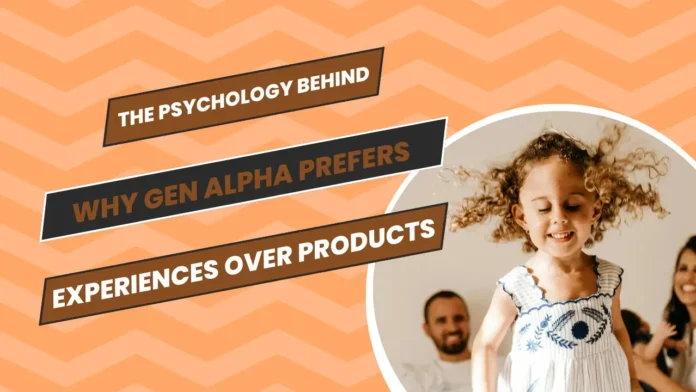The Psychology Behind Why Gen Alpha Prefers Experiences Over Products: In today’s rapidly evolving world, Generation Alpha (those born from 2010 onwards) is quickly becoming a dominant force in shaping consumer trends and preferences. One of the most fascinating insights into this generation is their preference for experiences over physical products. Unlike previous generations that often placed value on material possessions, Gen Alpha seeks out memorable experiences that enrich their lives. This shift in priorities is driven by several psychological and sociological factors that offer a deeper understanding of why experiences are at the forefront of their desires.
The Impact of Digital Natives on Experience-Driven Preferences
Generation Alpha is often referred to as the first generation of digital natives. From an early age, they have been surrounded by digital technology, from tablets and smartphones to virtual reality. This immersion in the digital world has cultivated a mindset where virtual experiences are just as valuable, if not more so, than tangible products.
With the rise of social media platforms such as TikTok, YouTube, and Instagram, Gen Alpha is constantly exposed to influencers and peers showcasing unique experiences. Whether it’s traveling to exotic locations, participating in online gaming tournaments, or attending virtual concerts, these activities have become the currency of social interaction. Social validation and identity are built around shared experiences rather than material goods.
Emphasis on Emotional Fulfillment
One of the key drivers behind the shift toward experiences is the emotional satisfaction that they provide. Research suggests that experiences, unlike products, have a lasting emotional impact. For Gen Alpha, the excitement of attending a music festival, going on an adventure trip, or even participating in a digital scavenger hunt offers a deeper sense of fulfillment than purchasing the latest gadget.
Memory formation is also stronger with experiences. While material products can lose their appeal over time due to obsolescence or wear, memories of unique experiences tend to improve with age. The act of reminiscing allows Gen Alpha to relive their experiences, creating a cycle of emotional reinforcement that further enhances their preference for experiences over products.
The Influence of Sustainability and Minimalism
Gen Alpha has grown up in an era where environmental sustainability is a prominent topic. The constant discourse around climate change, overconsumption, and environmental degradation has led them to question the long-term impact of purchasing physical products. As a result, many members of Gen Alpha are adopting a minimalist mindset, choosing to invest in experiences that have a smaller environmental footprint.
Eco-consciousness plays a significant role in this behavior. Rather than accumulating possessions, which may contribute to environmental harm, Gen Alpha opts for sustainable travel, attending environmentally-friendly events, and participating in digital experiences that leave little to no carbon footprint.
The Role of Social Connections in Experience-Based Culture
Social connections and peer validation are crucial for Gen Alpha, and shared experiences often serve as the foundation for building and strengthening these relationships. Collective experiences, such as attending concerts, participating in online multiplayer games, or engaging in community service projects, allow Gen Alpha to connect with like-minded individuals and create a sense of belonging.
Moreover, these experiences are often documented and shared on social media platforms, further enhancing their value. The ability to share experiences online and receive immediate feedback through likes, comments, and shares adds an additional layer of gratification that material possessions cannot offer. This has led to the rise of the “Instagrammable experience” phenomenon, where the aesthetic and shareability of an experience are as important as the experience itself.
Instant Gratification vs. Long-Term Happiness

In a world where instant gratification is increasingly accessible, experiences offer a unique balance between short-term excitement and long-term happiness. For Gen Alpha, the process of planning, anticipating, and finally engaging in an experience can be more rewarding than simply acquiring a product. Anticipatory joy plays a major role in this, as the buildup to an event or experience can generate excitement and elevate mood levels.
Unlike products, which often lead to a hedonic treadmill—the constant pursuit of new items to maintain satisfaction—experiences offer a more lasting form of happiness. The emotional highs associated with experiences, combined with the memories created, provide a more meaningful sense of well-being for Gen Alpha.
The Rise of the Experience Economy
The shift in preferences is not just a psychological trend; it’s a reflection of the broader experience economy. In recent years, businesses have adapted to cater to this new generation’s desires by offering experiential services that focus on providing unique, memorable events. Companies like Airbnb, for instance, have created entire ecosystems around offering personalized experiences, from guided local tours to cooking classes with renowned chefs.
Retailers and brands are also recognizing the importance of experiences and are incorporating experiential marketing strategies to engage Gen Alpha. For example, many companies now host pop-up events, offer virtual reality shopping experiences, or create immersive brand activations that allow consumers to interact with their products in innovative ways. By doing so, these businesses tap into Gen Alpha’s desire for engagement and connection beyond just the purchase of goods.
Personal Growth and Self-Discovery
For Generation Alpha, experiences are also a tool for personal growth and self-discovery. In a world where education is increasingly accessible online, and information is just a click away, experiences serve as a way for Gen Alpha to explore their interests, develop new skills, and learn about different cultures.
From attending workshops and camps to participating in online learning communities, these experiences enable Gen Alpha to expand their horizons and cultivate their talents. This generation views experiences as an investment in their personal development rather than mere entertainment.
Conclusion: A Generational Shift in Values
The preference for experiences over products among Gen Alpha is a clear indication of a generational shift in values. Driven by a desire for emotional fulfillment, sustainability, social connection, and personal growth, this generation is redefining consumer behavior. As businesses and brands adapt to meet these changing preferences, it is essential to understand the underlying psychology that drives Gen Alpha’s choices.




